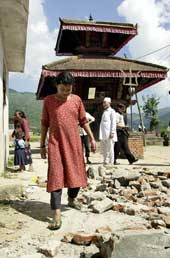 |
| A Nepalese girl walks through debris caused by a bomb blast at Sankhu, 28 km northeast of Kathmandu. (AFP) |
Kathmandu, Oct. 13 (Reuters): At least 37 people were killed when about 1,000 Maoist rebels tried to storm a police training centre in western Nepal two days after ending a truce with the government, police said today.
The clash began late yesterday when the rebels fighting to topple the constitutional monarchy began firing from higher ground at the roadside camp in Bhaluwang, 400 km west of Kathmandu.
“The rebels had snapped telephone cables, set up roadblocks by felling trees or blowing up highway bridges to prevent reinforcements from coming,” a witness, Krishna Adhikary, said.
The clash came after 37 Maoists and three policemen were killed in a fierce gunbattle also in the west of the Himalayan kingdom late on Friday, ending a nine-day truce called by the rebels for Nepal’s largest Hindu festival, Dasain.
A dozen policemen on patrol and 25 rebels have died in the most recent gunbattle, a police official said.
“More rebels might have died and the search for bodies in neighbouring jungles is continuing,” he said. There was no immediate comment from the rebels, who have tended to report smaller tallies than police figures in the past.
The Maoists, who steal money from banks and arms from security forces, have been fighting since 1996 to set up a communist republic in the impoverished nation.
They have stepped up attacks since walking out of peace talks in August after the government turned down a demand for a new constitution to decide the future of the monarchy. The revolt has claimed more than 7,600 lives, ravaged the economy, crippled tourism in the scenic mountainous nation and endangered stability.
Warning that the “senseless” acts of violence could damage Nepal’s fragile infrastructure, Germany has offered to mediate to resume the peace process in Nepal. “The violent internal conflict is having a negative effect on Nepal’s image abroad and is depriving the country of the benefits of positive development,” German ambassador to Nepal Rudiger Lemp said, adding Berlin is ready to mediate to resolve the problem.
Pointing out that the European Union and its member states had offered to assist in the peace process, he said both the conflicting parties would have to be willing to accept such a role.
However, there was no positive signal from either side and instead both sides warned against excessive outside interference being sounded from different quarters, he said.
“We have witnessed such senseless acts in the past and are compelled to assume that the insurgents, who profess to act in the interests of the people, are hell-bent on creating maximum damage to the fragile infrastructure of one of the poorest countries of the world,” he said.










